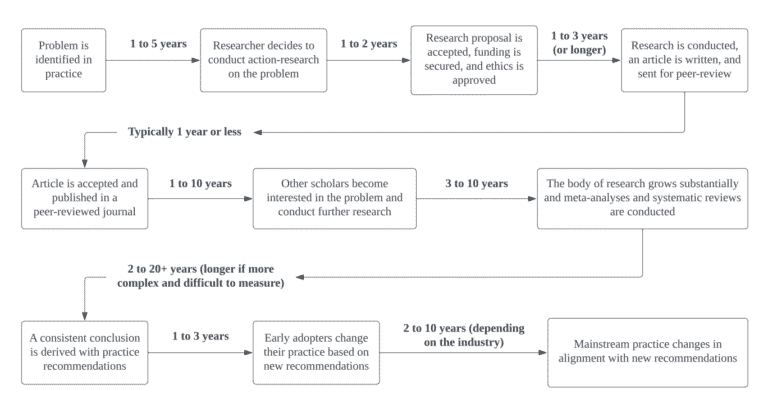Personal Development
The Research-Practice Gap in Education: Evidence-Based Isn’t Enough
As educators, we all strive to provide the best learning experiences for our students. However, implementing evidence-based learning strategies presents numerous challenges due to the complex nature of education systems. In this article, we will explore why evidence-based learning is not enough and why we need to address the research-practice gap in education.
Education’s Research-Practice Gap
There is often a significant disconnect between educational research and its practical implementation in the classroom. In spite of the abundance of research evidence available, educators require help applying these findings to their classrooms. Several factors contribute to this gap, including the difficulty of translating research findings into practical applications and the slow pace of educational system change.
Research is a vast and diverse field, and it can be challenging for teachers to stay up to date with the latest findings, let alone apply them effectively in the classroom. The time and resources available to teachers are limited for sifting through research evidence, determining which findings are relevant to their teaching methods, and adapting them accordingly.
Furthermore, educational research often presents complex and nuanced findings that are difficult to translate into practical applications. It may be difficult for teachers to apply these findings effectively due to a lack of training or expertise. Teachers may also find it difficult to implement research findings in practice if they are not aligned with the classroom’s realities.

To stay safe, systems must change slowly
Much like the healthcare industry, education takes a safety-first approach. If it does not, tragedy can result.
To alleviate morning sickness, thalidomide was commonly prescribed to pregnant women during the late 1950s and early 1960s. In the end, however, thousands of babies were born with severe birth defects, causing a global health crisis. This tragedy profoundly affected the pharmaceutical industry and led to stricter regulations and testing requirements to ensure the safety of new drugs.
Introducing new teaching methods and educational practices requires careful planning and consideration to ensure they align with broader educational goals and don’t have unintended negative consequences. However, this cautious approach can also mean that new research findings take a long time to be incorporated into the system, even if they are evidence-based.
There is a rapid change in society
Society is in a constant state of flux due to technological advancements, globalization, and cultural shifts. Unfortunately, education systems are unable to keep up with the changing requirements of learners in this environment. The result is a widening gap between what is taught in classrooms and the skills and knowledge necessary for success in the real world. This disparity won’t be rectified anytime soon as the rapid evolution of society far outstrips the capacity of large systems such as schools to adjust accordingly.
The Disparity Between Learner Needs and Education System
The gap between what learners require and what education systems give is increasing. Although there is a lot of research, teachers often are overloaded with data and don’t have time to implement new discoveries into their instruction. Because of this, researchers lack real-time feedback on the effective impact of their research outcomes. In addition, many entrenched issues within the educational framework can impede meaningful progress, such as bureaucratic protocols, fiscal issues, and opposition from those who prefer to keep things as they are.
Metacognition and Self-Regulated Learning
By providing learners with the tools to navigate the imperfect education system, we can help them become more successful and efficient.
In summary, evidence-based learning alone will not suffice in tackling the difficulties present in education today. It is vital we bridge the space between research and reality by concentrating on self-regulated learning and metacognition. This way, learners can better understand the complexities of the educational system and be more prepared to thrive in an ever-evolving world. We have great sympathy for both teachers and researchers dealing with these problems, and are devoted to finding resolutions that all parties involved can benefit from.
Click The Link Below To Get 90% Off Icanstudy Program by Dr. Justin Sung


